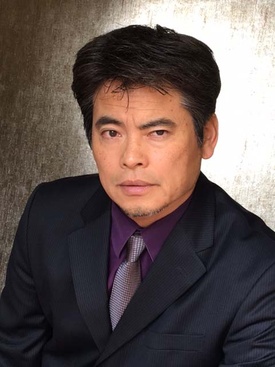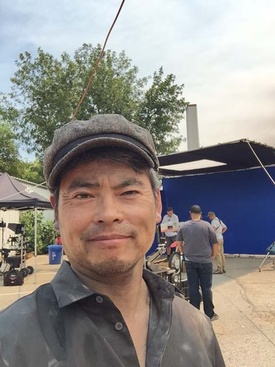After retiring from teaching, he went to Hollywood.
Your life is made up of choices, decisions, and actions. If you know what kind of person you want to be and what makes you happy, then you can move in that direction. Eiji Inoue, a 56-year-old Japanese actor with 30 years of experience in Hollywood, wanted to become an actor who could express his acting skills to the world. Following his heart, he left his stable job as a teacher and came to the United States in February 1992.
"99.99% of the people around me were against me going to the United States. My parents were so convinced that something was possessing me that they even went to see a priest. I played volleyball in junior high school, track and field in high school, and then Chinese martial arts, and I continued to play sports. I admired Jackie Chan and wanted to become an action star. After graduating from university, I worked as a high school teacher in Gifu for four years. I was passionate about my job as a teacher. But when I was 26, I felt the time had come for me (to try acting in the United States)."
In the summer of 1990, he applied for retirement and attended a teacher's retirement briefing session. Looking back, he remembers that everyone around him was older and nearing retirement, and Eiji was the only young person there. However, he himself thought, "I'm 26 years old, so I'm not young enough to try acting in America. It's too late." And when he landed at Los Angeles Airport with a student visa in hand, he recalls being overwhelmed by the atmosphere, which was 180 degrees different from Japan.
"That was my first time in America. Up until then, the only place I'd been overseas was China. Didn't I come to check things out? The idea of checking things out never even crossed my mind. There was no Internet in those days, and it was the era of pagers."
The only person he could rely on was Nori-chan, a Japanese dancer living in Los Angeles whom he had met in Nagoya. He enrolled in a language school introduced by Nori-chan and settled in a boarding house in Los Angeles, but the Los Angeles riots broke out soon after. Eiji witnessed people stealing groceries from the supermarket through the window of his room.
"My life in America began. I bought a car, but I was scammed and it broke down soon after, and the next car I bought was also no good, so I wasted my money. I realized that if I didn't buy from someone I knew, I would get scammed, so I bought my third car from a friend of a friend. It was a 1977 Toyota Celica, and I drove it for quite a long time."
Eiji started working as an extra when he started his life in America. However, the problem he faced in continuing his activities was joining the Screen Actors Guild (SAG, AFTTRA) and getting a green card. Immediately after arriving in America, he visited the office of Hollywood star Sho Kosugi. Eiji had found out where Sho was staying while visiting Gifu and had met him. Sho, who greeted him at the office, advised him, "You can't work in America without a green card. It will take 10 years to learn English. There is no apprenticeship system in America (even if you want to become my apprentice)." However, he was able to join the first union when he was scheduled to appear in a Coca-Cola commercial at the end of the year he arrived in America. He also applied for a green card lottery and was lucky enough to win it two years after arriving in America.
The decision to move to the United States was the right one.
His career has steadily progressed since then, with roles at the Japanese restaurant Amagi, comedy clubs Laugh Factory and Comedy Sore, cabaret shows, stunts, TV commercials, and stage productions in both Japanese and English, before landing roles in major films such as Pearl Harbor, Takeshi Kitano's Brother, Adam Sandler's Click, and The Last Samurai, where he played opposite Hiroyuki Sanada.
When I asked Eiji, "It must have been an emotional experience for you to co-star with a Japanese star like Sanada Hiroyuki in Hollywood?" he answered, "I don't mean to be arrogant, but I don't feel any intimidation at all even around people who are called Japanese stars. I felt that the work of an actor was a kind of technical job, and I thought of us as professionals sharing the same set, as friends."
Rather, she says that the most emotional moment was when she was selected to appear in the aforementioned Coca-Cola commercial. "I was really happy when I was selected after winning the first, second, and third auditions." What's more, it was amazing how quickly it happened, as it happened in the same year she moved to the US. In 1998, she made her US debut in the TV drama "Brooklyn South" on FOX.
However, 15 years ago, he hit a wall. "Suddenly, I stopped being invited to auditions. I didn't really know why. So for about 10 years, I appeared in indie films as my graduation project as a film major. I wanted to appear in good films, even if they weren't major productions."
At the same time, he worked as an instructor at sports clubs, teaching martial arts, tai chi, yoga, and kickboxing. Then, three years ago, he met casting director Yoko Narahashi, which prompted him to once again try out auditions for major productions.
When asked about his future goals, Eiji replied, "To win Best Actor at the Academy Awards. Even then, it's not like I have set it as a long-term goal, like 'I want to win it in the future,' but more like 'I'll win it next year.' In other words, I feel that if I can bring myself to that level of energy, I can make it happen, and I can make it happen."
The position and image of Asians in Hollywood movies has changed dramatically since Eiji moved to the United States 30 years ago. In 2020, the Korean film "Parasite" won the Academy Award for Best Film. In today's world, the day when Eiji's long-term efforts will be highlighted may come in the near future, as he himself says, rather than in the distant future.
Finally, when asked "What would you like to say to yourself 30 years ago when you decided to go to America?", he smiled and said, "I want to tell him, 'Well done. That decision was the right one.' At the time, I thought I had to go ahead and go to America, even if it meant throwing my parents away (laughs). I didn't want to lie to myself. And now, it's turned out just as I had imagined. The decision I made back then was not wrong."
© 2021 Keiko Fukuda







